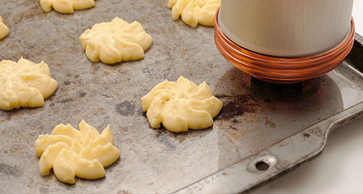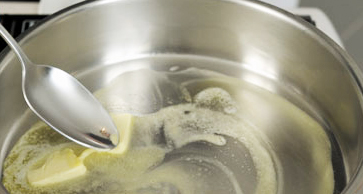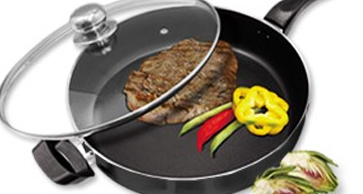Oil from Flint Rock
Oil from Flint Rock
The Mishna in Yoma (3:11) relates that the family of Kohanim known as Bais Gormo, having perfected the art of baking the Lechem HaPanim [the Show Breads that were offered on the Holy Table in the Temple], maintained a monopoly on that skill. Although the Talmud (Yoma 36a) explains that their motives were altruistic, Chazal nevertheless felt that their reticence to divulge this secret was inappropriate, and included them in the group always referred to L'Gnai - in an uncomplimentary manner. As to the nature of the "secret", Rashi explains that the intricately-shaped Lechem Hapanim were baked in molds located on the inside walls of the oven, and it was exceedingly difficult to remove the loaves without breaking them. It was the skill of removing the bread without pieces of it sticking to the walls that Bais Gormo had mastered and refused to share. The problem of food sticking to cooking surfaces has bedeviled cooks and bakers ever since. Food scientists have worked assiduously on unraveling a "non-stick" secret ever since. As we shall see, these products can raise some sticky Kashrus concerns.

Edible fats have long been used as lubricants and non-stick agents, and their historical derivation from animals has had interesting ramifications. In 1857, the British managed to foment the Sepoy Rebellion in India with the introduction of the Enfield rifle, the bullets for which were lubricated in a mixture of beef tallow and lard. To load the rifle, the soldier was obliged to bite off the tip of the fat-encrusted paper bullet casing, thus eating both tallow sacred to the Hindu and lard considered abominable to the Muslims - a sure-fire recipe for mutiny. As regards the Kosher status of animal fats and marine oils, those derived from non-Kosher species (e.g., swine and whales) are clearly non-Kosher. Even animal fats derived from inherently Kosher species (e.g., cattle and sheep) could only be considered Kosher if the animals were slaughtered and inspected in accordance with Kosher law, and then only if the acceptable fat were soaked and salted to remove the blood. Much of the fat found on the internal organs of Kosher animals is considered Chelev and are prohibited under all circumstances.
As regards marine oils, the fish from which the oil is made must be monitored to ensure that they meet Kosher requirements (i.e., have removable scales and fins). The level of inspection that would thus be required generally precludes the use of bulk loads of fish or offal, both of which are common raw materials for fish oil processing. From a practical perspective, it is impossible to collect, process, and render Kosher animal fats on an industrial scale, and the production of Kosher marine oil poses significant challenges. Both are therefore usually assumed to be non-Kosher.
The baker's need to prevent bread from sticking was not limited to the Bais Hamikdash, and the use of animal fats for this purpose has historically created major problems in ensuring the Kosher status of the proverbial Staff of Life. The Gemora (Pesachim 30b) quotes a Baraissah that one should not bake bread on an oven surface that had been smeared with Kosher animal fat, since the fat would render the bread fleishig thus violating the injunction that all bread must be Pareve. Non-Kosher fats, of course, would certainly render the bread unacceptable, and their use has historically been one of the greatest obstacles to Kosher certification. To complicate matters, such "release agents", as they are known industrially, are not technically considered "ingredients" under U.S. food law, since they are not integral to the product itself. Rather, they are considered "processing aids", which need not be listed on the ingredient declaration. These processing aids, however, permeate all stages of the baking process. After mixing, a batch of dough is typically placed in a large trough, where it can be stored or left to rise. To prevent the dough from sticking to the trough, "trough grease" is used. When the time comes to separate the dough into loaf-sized portions, a machine called a "divider" is used, and to prevent the dough from sticking, "divider oil" is applied directly to the dough. In many cases, the bread is baked in a loaf pan, which is first coated with a "panning oil" to prevent the dough from sticking to it. When baking cookies, they are normally placed upon papers permeated with various types of oil to prevent sticking and to keep the pans clean. While the industry may not consider this torrent of oil to be an ingredient, Kashrus certainly does, and the source of the oil used is critical.

One solution to this problem is to use a vegetable fat, and indeed this is often the case. Vegetable fats, however, tend to oxidize quickly [i.e., become rancid] and create a film buildup on the equipment. Other lubricants, perhaps presaged in the verse "And oil from a flint", have come to the rescue. Petroleum [literally, oil from rocks - from the Latin/Greek petros (rock) and oleum (oil)] is an inherently Kosher product, and one of the highly refined petroleum derivatives is known as mineral oil. Mineral oil is tasteless and very stable, and is often used as divider and pan oil. [Interestingly, although pure mineral oil is inherently Kosher and contains no Chometz, its use on Pesach may be compromised by antioxidants routinely added to maintain its freshness. Often, Vitamin E (tocopherol) derived from soybeans is added for this purpose, raising the issue of Kitniyos. Fortunately, the level of this ingredient in mineral oil is infinitesimal and poses no significant issue.] Trough grease, however, poses a thicker problem. Historically, the word grease implied animal fat (from the Latin crassus - fat; in Danish, gris means pig), as opposed to oil, which implies a vegetable product (from the Greek elaion - olive). Some petroleum-based greases indeed derive their solid consistency from the lard added to them. Fortunately, Kosher blends of petroleum and vegetable fats have been developed and can be used as trough grease.
The use of grease in food preparation is not limited to release agents, however. Machinery used in food production requires lubrication, and such grease often comes in contact with the product. Government regulations recognize that such grease - even if not declared as an ingredient - mixes with the food and, thus, requires that "food-grade lubricants" be used. Kosher concerns are certainly no less cogent, and it is therefore incumbent for Kosher productions to require the use of Kosher grease for these purposes.
Another approach to creating Kosher release agents and lubricants takes the concept of "rock oil" one step further. Animal fats, vegetable oil, and petroleum are all members of a group of carbon-based compounds called organic chemicals. Silicon, the second most common element in the earth's crust, is found in sand and rocks, and occupies a space directly below carbon in the Periodic Table. As such, many of the characteristics of silicon are very similar to those of carbon, and scientists have succeeded in creating a series of silicon-based synthetic compounds that mimic those based upon carbon. These polysiloxane (or silicone) compounds have lubricating properties similar to organic fats yet they are much more stable, and serve as the base for many Kosher synthetic release agents as well as for machinery grease. Nevertheless, although silicone oil itself may be inherently Kosher, finished products that contain it may contain non-Kosher fats and thus require a reliable Kosher certification. [The use of "rocks" in food is not limited to release agents. Silica gel, a highly refined form of glass, is used as a desiccant, a substance that absorbs moisture. This "gel" is actually very porous sand, and when added to food powders such as spices, prevents those powders from caking. It poses no Kashrus concerns.]
Another means of addressing these sticky issues is to bake products on a special non-stick paper or pan liner, such as "vegetable parchment paper" or "Quilon® Paper". Parchment paper is produced by treating conventional papers with a strong acid, which causes the paper fibers to swell and partially dissolve into a gel. The acid is then removed and the gel pressed back into a solid paper form, creating a material that resists oil and water. Its appellation of "parchment" stems from its similarity to true parchment in strength and durability, but is not animal based. Quilon® is a registered trademark of the Dupont Company, and refers to paper that is treated with a mixture of chromium and various fatty acids. Many of the original Quilon® papers contained non-Kosher stearic acid, and for that reason it is important to ensure that only baking papers with reliable Kosher certification are used. Fortunately, a number of Kosher versions of non-stick papers are available on the market, although they are often referred to as "quilon" for convenience, even though they are not manufactured by Dupont. The most durable - and expensive - non-stick paper is coated with silicone. While silicone may pose no Kashrus concerns, such papers may contain vegetable oils that do require a Kosher certification and raise concerns of Kitniyos for Pesach. Even the oldest non-stick film - the venerable wax paper invented by Thomas Edison - originally contained a mixture of paraffin and animal fats. Today, most wax paper uses only paraffin (a petroleum derivative), but some versions may still contain objectionable ingredients or be made on equipment used for a non-Kosher product. It is therefore important to ensure that wax paper bear a reliable Kosher certification.
The need to maintain a non-stick surface even extends to the ubiquitous Styrofoam® cup. These indispensable disposables are produced by "puffing" small polystyrene beads in a mold, causing them to expand into that shape. To prevent the cup from sticking to the sides of the mold, a small amount of a very slippery stearic acid compound (usually zinc stearate) is blended with the polystyrene beads to coat them before processing. As its name implies, stearic acid was originally derived from tallow (steer fat), which continues to be one of its major sources. Some Kashrus authorities have argued that it is important to use Styrofoam® products made with Kosher (vegetable-based) stearates. The consensus of most authorities, however, is that the minute amounts of stearate used are Halachically insignificant. Stearates pose a much greater Kashrus concern, however, when used as release agents in the production of many types of tablets, including medicines, candies, and sweeteners. These tablets are made by compressing a powder blend in a mold, and small amounts of calcium or magnesium stearate are typically added to the powder to ensure that the fine particles bind together into a solid and that the tablet does not stick to the die. In such a case, the release agent is actually added to the food itself as opposed to being applied to the equipment surface, thus making a reliable Kosher certification a far more pressing issue.

Attempts to create a non-stick coating are not limited to the factory and food plant. The classic non-stick solution, of course, is a luxuriant pat of butter or shortening melting in the skillet. However, in an effort to reduce the calories attendant to such a liberal use of fat, food scientists have developed a product that allows one to enjoy the non-stick properties of oil but without adding a significant number of calories. PAM® (International Home Products), as well as its competing versions, is a blend of oil, alcohol, and lecithin that is sprayed on the cooking surface. After being sprayed onto the cooking surface the alcohol evaporates, allowing a very thin layer of lubricating oil to remain. The success of these products has bred flavored versions, some of which contain dairy ingredients. Clearly, all such products require a reliable Kosher certification due to the oils and flavors they contain.
Incidentally, the advent of PAM® may have inadvertently led to a different Halachic concern. There are two basic methods of Kashering equipment, Hagola (boiling) and Libun (burning). Hagola operates under the theory that when boiling a pot in water, all of the flavor that had been absorbed into the pot will travel into the water, thereby purging the pot of any non-Kosher flavor and rendering it Kosher. Libun, on the other hand, renders the pot Kosher by incinerating the absorbed flavor. As a general rule, a pot used to cook food in liquids may be Kashered with Hagola, while those in which the food is cooked directly on its surface (such as a spit on which meat is broiled) must be subjected to Libun. The method required to Kasher a frying pan is the subject of much discussion. The Shulchan Aruch (O.C. 451:12) rules that Hagola is sufficient, and the Poskim (see Mishna Berura s.k. 63, 65) explain this ruling based upon the fact that the oil (or fat) that is normally used in frying is considered a liquid for this purpose. Thus, this food is considered "cooked in liquid". The Mishna Berura does note (s.k. 65), however, that where the oil or fat is but a mere coating on the pan surface, one cannot consider such cooking to be "with liquid", and the pan would require Libun. It would seem, therefore, that the introduction of PAM® into the marketplace may change the way we need to Kasher a frying pan and require Libun. [Please note that many other factors come into play when determining the method by which a frying pan should be Kashered, and a Sheila should be asked in each case. Be sure to indicate to the Rav if a release agent was used.]
The oldest "non-stick" coating is as old as cast iron cooking implements themselves. Iron is notorious for oxidizing (rusting) in the presence of water, and it was long known that coating iron with a layer of grease would inhibit such rust. It was also noted that by heating an iron utensil after it had been coated with fat, some of the fat would be absorbed into and react with the metal to give it its classic black patina. A pan so treated would continue to repel water even after being washed and, by the same token, resist food's sticking to it. This process, known as "seasoning a pan", is still used today to treat cast iron pots and skillets, and is a practical example of Blios, the Halachic concept of the absorption of food into metal. While the seasoning of a new cast iron pot has been de rigueur since time immemorial, one modern producer of such kitchenware sells a "pre-seasoned" product. The company uses a proprietary blend of oils to treat its product, and while it claims that this blend is vegetable based, its exact composition has not been divulged. The Kosher user may well be advised to avoid such a product.
The quintessential modern non-stick surface is, of course, Teflon®, the trademark for polytetrafluoroethylene (PTFE) developed about sixty years ago. It is one of the most slippery substances known to man, and through interesting scientific legerdemain it has been successfully bonded to cooking surfaces. Teflon® poses no inherent Kashrus concerns, but it does raise the question of the appropriate method by which Teflon-coated pots can be Kashered. While many authorities consider plastic to be subject to Kashering just as any other material (other than ceramics and, according to many opinions, glass), this is not universally accepted. It is interesting to note that while Rav Moshe Feinstein zt"l was reticent about Kashering plastics in general, he does specifically allow for the Kashering of Teflon® (see Igros Moshe, Even HaEzer IV:7).

In addition to solving a number of sticky issues, rocks have played an important part in our history. The Medrash (Yalkut Shimoni Chukas 763) notes that a rock was the source of great miracles, having wondrously exuded fire (Shoftim >6:21), honey (Devarim 32:13), oil (Ibid.), and water (Ibid., 8:15), even implying that the very same rock appeared in all four cases (see Zays Raanan, ibid.). As we have seen, modern science has allowed us to glimpse further into the miracles of rocks, to recognize their Kashrus implications, and incorporate these benefits into our daily life. After we light our Chanukah lights, the custom is to recite the Maoz Tzur. Hashem is referred to as our "rock" (Devarim 32:4), in Whose strength we place our trust and is the ultimate source of all these miracles.
